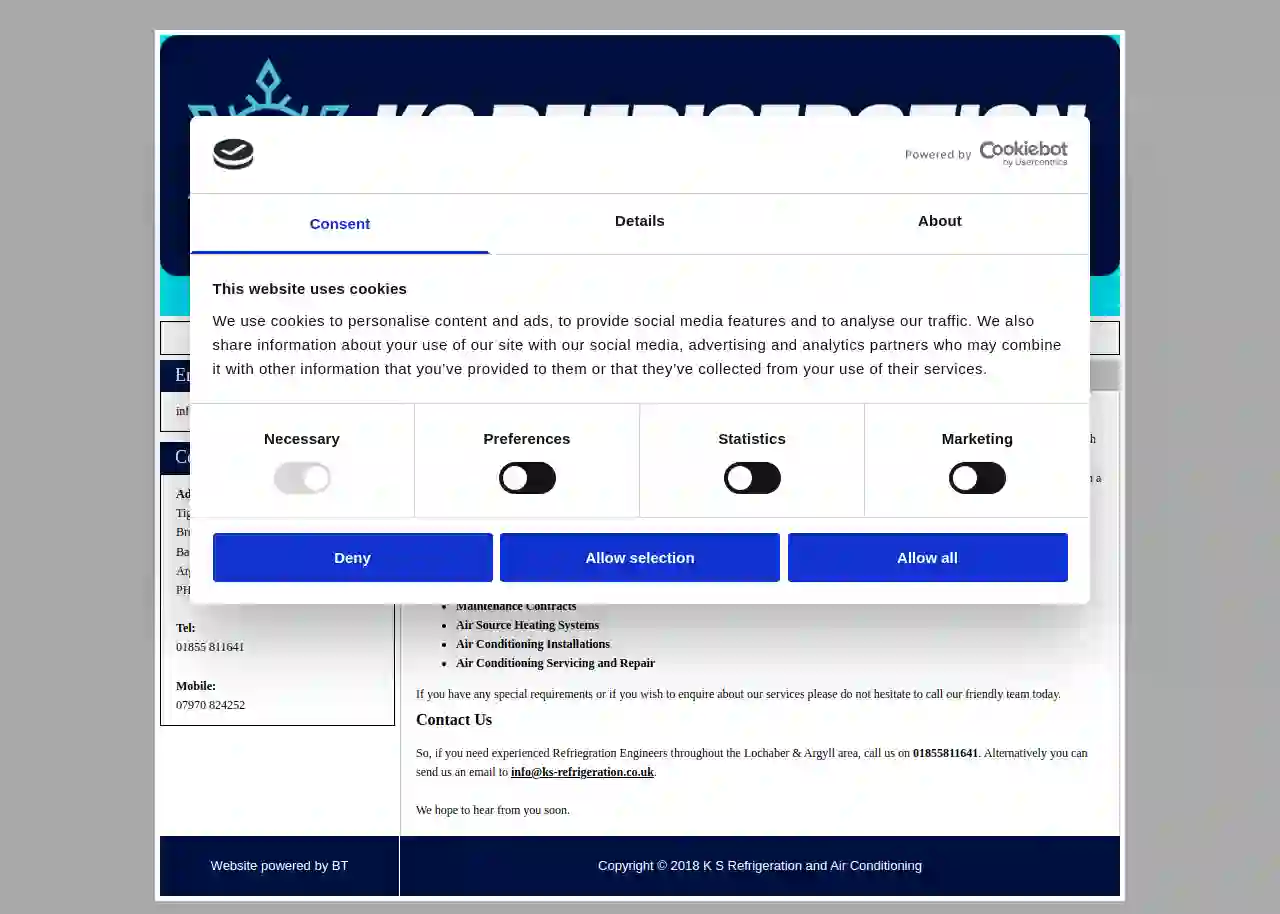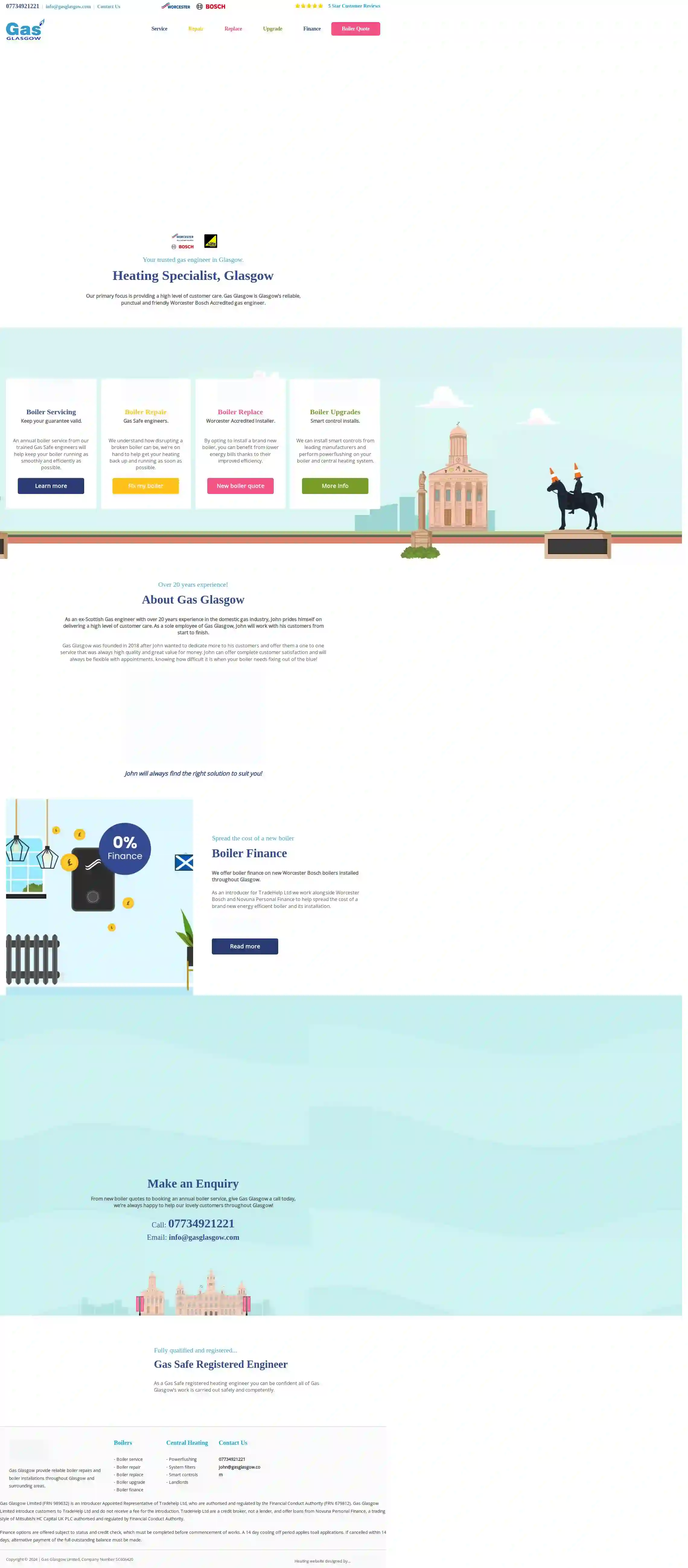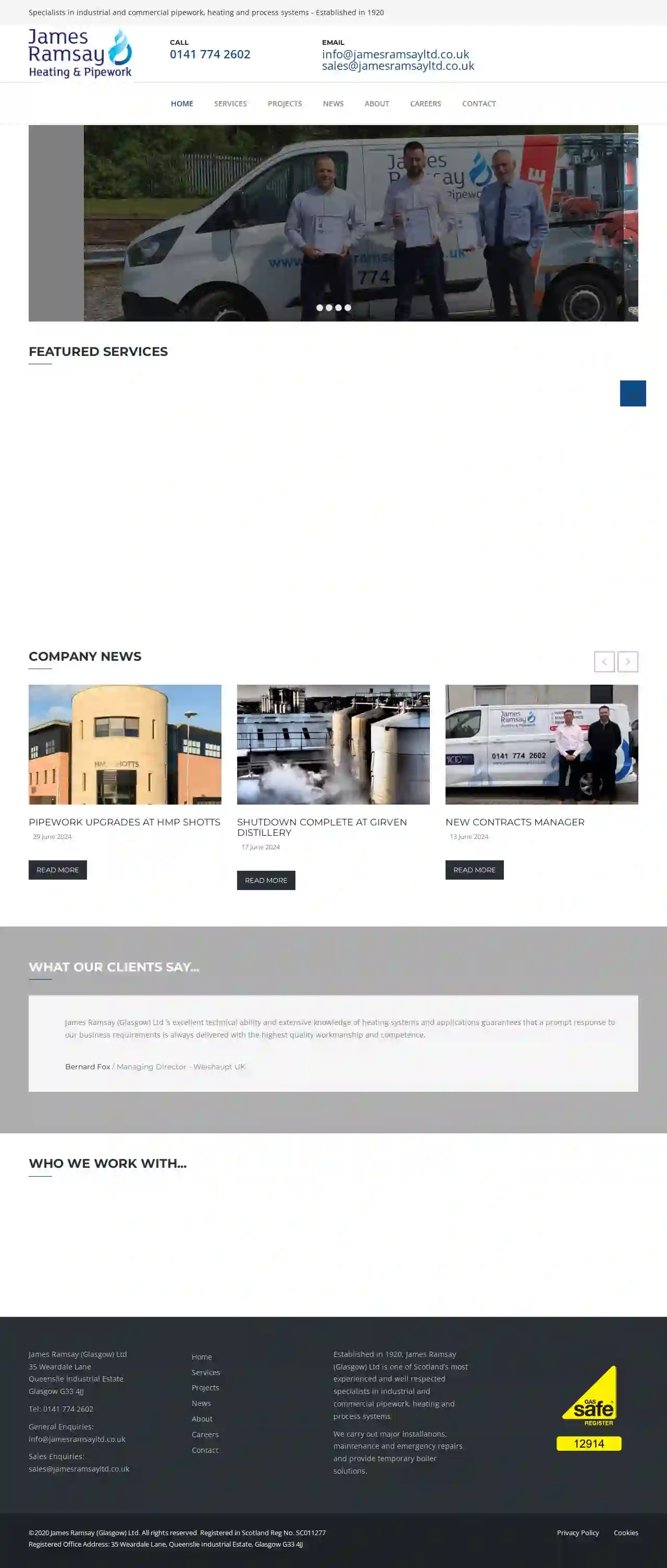Emergency HVAC Govan
Top 10 Emergency AC Repair in Govan
Receive up to 3 24/7 HVAC Repair quotes for your project today! Compare profiles, reviews, accreditations, portfolio, etc... and choose the best service.

Atlas Services Solutions
43 reviewsPavilion 2, 3 Dava Street, Glasgow, G51 2JA, GBAtlas Services Solutions are a leading Air Conditioning service business and part of the established Atlas Group. With over 50 years’ experience across the team, we pride ourselves on delivering an outstanding service for our clients, with all works completed – service and maintenance – fully compliant to both SFG20 regulations and manufacturers standards of quality. We not only work with our own clients, but also provide our services to other prospective clients, including other service providers and their clients. Our team members are highly skilled, fully qualified, conscientious engineers, able to overcome any challenge not only individually, but also as part a team, consistently providing our clients with a superior level of service. As a leading service solutions company and maintenance provider, we can provide all types of service works including, fault finding, commissioning, health checks, and maintenance for any business on VRV, VRF, Split Systems, Water Chillers, Heat Pumps, Refrigeration, Controls and Air Handling Units. To further enhance our range of services, we also provide- Comprehensive System Health Checks Degradation Reports Service Reports System Design Reports Our team are fully certified, qualified, with full training within the air conditioning industry. To ensure we keep up to date with an ever evolving industry, we ensure our team’s knowledge of new technologies and system design types is always kept up to date with manufacturer specific training within all sectors. We understand the needs and priorities of our clients and aim to provide the best service we can. Our engineers work with manufacturer specific testing equipment and software-based monitoring tools to ensure our high standards are consistently met. We work closely with our customers to tailor our services and budgets to meet their needs and priorities. Craig and his team at Atlas service solutions provide an exceptional level of professionalism and equipment knowledge. Their attention to detail and client requirements is superb and with the highest efficiency available. We look forward to continuing our working relationship with them moving forward within the industry cross group As a fully approved Daikin air conditioning UK service partner, Atlas Services Solutions Ltd has a long-standing relationship and are ful
- Services
- Why Us?
- Accreditations
- Our Team
- Testimonials
- Gallery
Get Quote
Serck Heat Exchange, Paisley
Unipart House, Garsington Road, Cowley, Oxford, Oxford, UK, GBSerck has stood for excellence in heating and cooling for over 100 years. Take advantage of our industry expertise paired with today's latest technologies to ensure your heat transfer projects are successful.
- Services
- Why Us?
- Accreditations
- Gallery
Get Quote
Gas Master
59 reviews9 Ash walk, Rutherglen, G73 4HF, GBWelcome to Gas Master Professional Works Fully insured Gas Safe Registered (formally Corgi) experienced Gas engineer specialist in Combination Boiler repair and new installations in Glasgow. Gas Master heating and Plumbing provide repair solutions for all heating related problems, full heating system design and installations. Our plumbing services include leaking pipes, burst pipes, removal and replacement of broken/leaking toilets, dripping taps, leaking and overflowing tanks, and installation of new pumps. Also, we provide plumbing and installation services for dishwashers, washing machines, showers and shower pumps, roof tanks, inside and outside taps, installation and repair of kitchen sinks and many more. Get Your Free Consultation & Quote Why We are Best in Industry Our experienced team of professionals ensures that every project is completed to the highest standards, providing reliable solutions for all your gas and plumbing needs. Founder GAS MASTER Advanced Technology At Gas Master, we harness the power of advanced technology to redefine the gas and plumbing industry. On-Time Project Completion At Gas Master, we understand the importance of timely project completion. We pride ourselves on our commitment to delivering projects on schedule. Expert Engineers At Gas Master, we take pride in our team of expert engineers. Our company is built on the foundation of knowledge, experience and expertise in the field of heating systems. Customer Support At Gas Master, customer support is at the heart of everything we do. We believe in building strong and long-lasting relationships with our customers. Our Services Boiler breakdown / repairs Boiler services Boiler replacements / installations Pumps and gate valves Central Heating installation and repairs Cooker, Hobs, Cooking Ranges Gas pipework designed and installed / upgrades Landlord certificate CP12 Show All Services Services we can provide and many more. Just get in touch via the Enquiry form. Boiler breakdown/repairs Boiler services Boiler replacements/installations Pumps and gate valves Central Heating installation and repairs Cooker, Hobs, Cooking Ranges Gas pipework designed and installed/upgrades Landlord certificate CP12 Smart thermostat WI-FI Controlled Radiator installations/replacements Towel radiators installations/replacements Burst and leaking pipes repaired/replaced PLUMBING Gas Master offers a comprehensive range of plumbing and drainage services to meet the needs of both residential and commercial clients. Our team of skilled plumbers
- Services
- Why Us?
- Accreditations
- Gallery
Get Quote
Paisley Boiler Installations
4.953 reviews115 Abercorn Street, 115 Abercorn St., Paisley, PA3 4AT, GBPaisley Boiler Installations is a team of experienced local plumbers and gas engineers fully certified and insured, serving Paisley and Glasgow. We offer a full range of plumbing, heating and boiler related services, including gas boiler replacement, boiler servicing, boiler repair, landlord gas safety checks, gas central heating services, central heating installation, commercial boiler installation, commercial boiler room services, commercial boiler services, oil fired boiler services and LPG boiler installation. We aim to provide brilliant customer service at great local prices. We always suggest looking at repairing a boiler or heating system before replacing it. Only if the repair is too expensive, because of parts being out of manufacture for instance, would we suggest replacement. But if a new boiler installation is the best choice then we can give you all the options and help you choose the best solutions for your home and budget.
- Services
- Why Us?
- Accreditations
- Testimonials
- Gallery
Get Quote
KS Refrigeration
52 reviewsBallachulish, Tigh ArdBrecklet, PH49 4JG, GBWelcome to KS Refrigeration and Air Conditioning, a family run business specialising in Refrigeration, Air Conditioning and Heat Pump Systems. We are a reliable and experienced team of engineers providing Refrigeration and Air Conditioning services in Lochaber and Argyll. Our team is approved by REFCOM, Chas and BESA, ensuring a professional service for our customers. We offer a range of services including Refrigeration Sales, Refrigeration Installations, Refrigeration Servicing and Repair, Maintenance Contracts, Air Source Heating Systems, Air Conditioning Installations, and Air Conditioning Servicing and Repair. If you have any special requirements or would like to enquire about our services, please do not hesitate to contact us.
- Services
- Why Us?
- Accreditations
- Gallery
Get Quote
Gas Glasgow
566 reviewsGlasgow, GBWith over 20 years experience, Gas Glasgow are a Worcester Bosch Accredited installer offering high quality boiler installations and services throughout Glasgow. Our primary focus is providing a high level of customer care. Gas Glasgow is Glasgow’s reliable, punctual and friendly Worcester Bosch Accredited gas engineer. As an ex-Scottish Gas engineer with over 20 years experience in the domestic gas industry, John prides himself on delivering a high level of customer care. As a sole employee of Gas Glasgow, John will work with his customers from start to finish. Gas Glasgow was founded in 2018 after John wanted to dedicate more to his customers and offer them a one to one service that was always high quality and great value for money. John can offer complete customer satisfaction and will always be flexible with appointments, knowing how difficult it is when your boiler needs fixing out of the blue! John will always find the right solution to suit you!
- Services
- Why Us?
- Accreditations
- Our Team
- Testimonials
- Gallery
Get Quote
James Ramsay
4.77 reviews35 Weardale Lane, Queenslie Industrial Estate, Glasgow, G33 4JJ, GBEstablished in 1920, James Ramsay (Glasgow) Ltd is one of Scotland’s most experienced and well respected specialists in industrial and commercial pipework, heating and process systems. We carry out major installations, maintenance and emergency repairs and provide temporary boiler solutions.
- Services
- Why Us?
- Accreditations
- Testimonials
- Gallery
Get Quote
Correctair Solutions (Scotland) Ltd
Unit 45-51, St James Business Centre, Linwood Road, Linwood, GBWelcome to Correctair Solutions Scotland, experts in cleanroom validation and critical path ventilation based in Renfrewshire and servicing the UK. We offer a wide assortment of professional operations that we can carry out for our clients, spanning the conventional to the more specialized areas that we've carved out for ourselves. Our services include hospitals, pharmaceuticals, LEV and safety cabinets, and more. We provide a high-quality and faultless service, from annual verifications to vent cleaning and servicing of all ventilation-related plant and equipment. We also offer consultancy services and project manage upgrades to ensure compliance to the guidance.
- Services
- Why Us?
- Accreditations
- Testimonials
- Gallery
Get Quote
Glasgow City Plumbers
4.915 reviewsCowlairs Ind Est, 29 Finlas St, Glasgow, G22 5DU, GBGlasgow City Plumbers Ltd is a team of trusted and dependable plumbers, servicing domestic and commercial customers throughout the city and wider area. We have been providing a full range of plumbing and gas services for more than 20 years, and can be counted on at all hours of the day, even in an emergency. Our local plumbers and boiler experts take the time to fully understand your needs, so that we can provide the right solution the first time, every time. We are fully qualified and Gas Safe registered, so you can rest easy knowing you’ve made the right choice. We are also IPAF, FGAS CSCS, Gas Safe and CHAS accredited. Learn about our team and what we do, and get in touch for a competitive no-obligation quote.
- Services
- Why Us?
- Accreditations
- Our Team
- Testimonials
- Gallery
Get Quote
Richardson Gas & Heating Limited
522 reviews12 First Avenue, Dumbarton, G82 2PU, GBAt Richardson Gas & Heating we are a fully insured Gas Safe registered company with over 12 years experience installing, servicing and repairing all gas appliances and heating systems for customers all over the west of Scotland and Central Belt. We understand that the failure of your heating system can be a worrying time for homeowners. That's why we're available 24 hours a day, 365 days a year. Whatever you need to know about heating options for your home, we have experience and in-depth knowledge to clearly and simply explain what's available. You can call us and we can visit you at your home. You can be sure our advice and recommendations are completely impartial. We've built partnerships with many of the stand-out names of the heating industry to guarantee you the products and services which are ideally suited to your individual requirements.
- Services
- Why Us?
- Accreditations
- Gallery
Get Quote
Over 12,692+ HVAC Businesses registered
Our HVAC experts operate in Govan and beyond!
HVACCompaniesHub has curated and vetted Top HVAC Companies in Govan. Find the most reliable contractor today.
Frequently Asked Questions About Emergency HVAC Services
- Safety First: If you suspect a gas leak or any electrical hazard, evacuate your home or building immediately and contact your utility company or emergency services.
- Turn Off Your System: Turn off your HVAC system at the thermostat to prevent further damage.
- Document the Issue: If possible, take photos or videos of the problem to show the technician.
- Gather Information: Have your HVAC system's model and serial number readily available, along with any warranty information.
- Clear Access: Ensure clear access to your HVAC system for the technician.
- Prepare Questions: Write down any questions you want to ask the technician.
- Improve Energy Efficiency
- Extend System Lifespan
- Prevent Costly Repairs
- Enhance Indoor Air Quality
- Identify Potential Problems Early
- Ensure System Reliability
- Raise Your Thermostat: Set your thermostat to a higher temperature when you’re away. Consider using a programmable or smart thermostat.
- Use Fans: Fans can circulate air and make you feel cooler, even at a higher thermostat setting.
- Close Window Coverings: Keep curtains or blinds closed during the day to block out sunlight.
- Limit Heat-Generating Activities: Avoid running heat-producing appliances (ovens, dryers) during the hottest parts of the day.
- Annual AC Maintenance: Schedule yearly maintenance for your air conditioner to ensure it's running efficiently.
- Plant Shade Trees: Planting trees around your home can provide natural shade and reduce heat gain.
What should I do while waiting for an emergency HVAC technician?
What is a humidifier, and should I use one with my HVAC system?
What are the benefits of a preventative HVAC maintenance plan?
How can I cool my home efficiently?
What should I do while waiting for an emergency HVAC technician?
- Safety First: If you suspect a gas leak or any electrical hazard, evacuate your home or building immediately and contact your utility company or emergency services.
- Turn Off Your System: Turn off your HVAC system at the thermostat to prevent further damage.
- Document the Issue: If possible, take photos or videos of the problem to show the technician.
- Gather Information: Have your HVAC system's model and serial number readily available, along with any warranty information.
- Clear Access: Ensure clear access to your HVAC system for the technician.
- Prepare Questions: Write down any questions you want to ask the technician.
What is a humidifier, and should I use one with my HVAC system?
What are the benefits of a preventative HVAC maintenance plan?
- Improve Energy Efficiency
- Extend System Lifespan
- Prevent Costly Repairs
- Enhance Indoor Air Quality
- Identify Potential Problems Early
- Ensure System Reliability
How can I cool my home efficiently?
- Raise Your Thermostat: Set your thermostat to a higher temperature when you’re away. Consider using a programmable or smart thermostat.
- Use Fans: Fans can circulate air and make you feel cooler, even at a higher thermostat setting.
- Close Window Coverings: Keep curtains or blinds closed during the day to block out sunlight.
- Limit Heat-Generating Activities: Avoid running heat-producing appliances (ovens, dryers) during the hottest parts of the day.
- Annual AC Maintenance: Schedule yearly maintenance for your air conditioner to ensure it's running efficiently.
- Plant Shade Trees: Planting trees around your home can provide natural shade and reduce heat gain.